【讯息集锦】会议/项目申请
目录
1.中国社会学会年会青年博士论坛征文启事
来源:http://csa.cass.cn/xxdt/tzyg/201704/t20170417_3488362.shtml
2.台湾人类学与民族学学会2017年会
来源:http://www.taiwananthro.org.tw/conference/2138
青年博士论坛征文启事
中国社会学会年会是一次学术盛会,也是一个学术交流的公共平台,社会学界不少青年俊彦正是在学术年会上崭露头角,进而融入社会学共同体。多年来,“青年博士论坛”得到众多青年学者的积极参与,取得了圆满成功。同时,论坛还得到了学术期刊界同行的高度关注和认可。
为进一步搭建期刊界与学术界的学术交流与沟通平台,更好地为中国的社会学研究服务,北京大学社会学系、南京大学社会学院、中国人民大学社会学系、中国社会学会理论社会学专业委员会,以及《南京大学学报》编辑部将在2017年中国社会学年会上继续共同主办“青年博士论坛”。
本次论坛除向大会积极推荐年会优秀学术论文之外,还将组织优秀论文评选,优胜者将获得由中国人民大学郑杭生奖助学基金提供的奖学金,其中一等奖2000元/篇,二等奖1000元/篇,奖学金名额在3人左右。
本次青年博士论坛将扩大参与学术期刊规模,以为论坛投稿者提供更多的发表平台,拟由《南京大学学报》、《东南大学学报》、《南京师范大学学报》、《南京农业大学学报》、《河海大学学报》、《南京工业大学学报》、《中国矿业大学学报》以及《江海学刊》、《江苏社会科学》、《学海》、《广东社会科学》等知名综合性学术期刊组成“联合编辑部”,参与主办此次论坛。
现向广大青年博士和专家学者诚征论文。为使本次论坛顺利举办,现做如下几点说明。
一、征文对象及主题
论坛欢迎广大青年博士、专家学者踊跃投稿。征文主题不限,广大青年博士、学者可结合自身研究方向撰文,欢迎与博士学位论文有关的研究,尤其欢迎偏重于理论社会学方面的探索。
主办方收到论文后,将根据论文主题及内容设置研讨单元。
二、征文要求
1.稿件务必是原创作品,且未公开发表。
2.稿件内容包括:文章标题、作者姓名、中文摘要(不超过300字),关键词(3~5个);并在第一页页脚中注明如下信息:作者姓名、性别、学位、职称、单位、邮箱、电话等联系方式。
3.严格遵守学术规范,凡采他人学说,务必注明。论文规范及参考文献格式请参照《社会学研究》。
4.论文篇幅在10000~20000字之间为宜。
三、论文录用
本次论坛为青年博士、专家学者与学术期刊搭建了一个共同的学术交流平台,为方便广大学者向期刊投稿以及学术期刊的选稿,我们将根据投稿情况进行学术期刊的选题策划并从会议征文中直接选稿。本论坛的稿件处理流程如下:
1.投稿论文先由“期刊联合编辑部”组织各刊的社会学编辑进行联合初审
2. 初审通过以后,由主办方提交给本次论坛的专家委员会进行二审
3凡通过联合编辑部初审与专家二审的稿件,将由联合编辑部的各家期刊与作者协商,在论坛结束以后优先安排发表
4.通过专家委员会二审后,论坛将向作者寄邀请函,并安排主旨报告
5.会议将邀请相关领域的知名专家对该论文进行点评,并提出相应的评审与修改意见
6.本论坛非常欢迎青年博士以及专家学者和学术期刊的编辑进行面对面交流
四、论文提交方式
1. 论文题目及摘要,请在2017年5月20日前,通过电子邮件发送至qnlt2013@126.com。
2. 论文全文,请于2017年6月10日前,通过电子邮件发送至qnlt2013@126.com。
3. 论文摘要及论文全文,均以电子文本方式提交(请以WORD文档形式作为附件,邮件主题请以“年会征文+作者姓名”方式命名)。
五、举办时间及地点
具体时间及地点以年会组委会发布的公告为准,如有变动,主办方将及时通知。
六、会议邀请
凡提交论文的青年博士和专家学者都将获得参会资格。论坛主办方根据所提交论文的主题和学术质量,安排相应的主旨报告,报中国社会学会秘书处审核后,发出正式邀请函。
七、论坛联系人
1、论文提交邮箱:qnlt2013@126.com
2、论坛联系人
杜沙沙:
电话:15150510528,邮箱:510836292@qq.com.
贾超:
电话:15105161904,邮箱:497683403@qq.com.
臺灣人類學與民族學學會
2017年會
2017 Annual Conference of the Taiwan Society for Anthropology and Ethnology
徵稿啟事
Call for Papers
會議主題
(Main theme of the conference)
域外/境內.異己/我族.他方/自身:人類學的內外研究場域
(Exterior/Interior.Strange People/We Group.Other/Self: Anthropological Methodologies under Controversy)
會議日期(Date)
2017年10月21日(週六)、22日(週日)(October 21-22, 2017)
會議地點(Venue)
國立臺灣大學文學院(College of Liberal Arts, National Taiwan University)
主辦單位
(Host Organizer)
臺灣人類學與民族學學會(Taiwan Society for Anthropology and Ethnology)
合辦單位
(Co-organizer)
國立臺灣大學人類學系(Department of Anthropology, National Taiwan University)
「域外/境內˙異己/我族˙他方/自身:人類學的內外研究場域」
Exterior/ Interior•Strange People/We Group•Other/Self: Anthropological Methodologies under Controversy
主軸議題/ 標竿課題/ 具體論題
(sub-themes / lines / streams)
I. 域外/ 境內(territory)
A. 區域域外與區域境內(region)
1. 臺灣研究論評(on Taiwan)
2. 非臺灣研究論評(on out of Taiwan)
3. 臺灣與外域的整合研究(integration: Taiwan and out of Taiwan)
B. 人群域外與人群境內(peoples)
1.臺灣境內人群的當代與史前研究(contemporary and prehistoric studies: Taiwan)
2.臺灣域外人群的當代與史前研究(contemporary and prehistoric studies: out of Taiwan)
3.原住民的本土性與域外網絡(indigenous network)
C. 心理域外與心理境內(psychology)
1. 自我認同的混淆(confused self-identity)
2. 自我認同的堅持(persistent self-identity)
3. 本土客家與域外客家(Hakka: native and non-native)
D. 社會域外與社會境內(society)
1. 當代與史前社群界域的建置(social boundary)
2. 社會網絡的範圍(social network)
3. 跨越社會的族群組織(ethnic organization)
E. 經濟域外與經濟境內(economy)
1. 跨國經濟與跨國文化(trans-national issues)
2. 生業與經濟的辯證(subsistence and economy)
3. 客家經濟的全球性(Hakka economy)
F. 性別域外與性別境內(gender)
1. 性別類屬的挑戰(gender categories)
2. 性別認同與性別認知(gender identity)
3. 同性與異性的辯證(homo and hetero-sexuality)
G. 知識域外與知識境內(knowledge)
1. 傳統知識的崛起(traditional knowledge)
2. 傳統與新款知識的逢遇(encountering knowledges)
3. 原住民生態智慧論評(indigenous ecological knowledge)
H. 展演域外與展演境內(performances)
1. 為何為誰演出?(perform for what and whom?)
2. 展演的競爭與協力(performing competition and cooperation)
II. 異己/ 我族(grouping)
A. 異與己的分界論述(others and we group)
1. 認同的形成(formation of identity)
2. 考古學如何研究認同(archaeological viewpoint on identity)
3. 原住民身份的得與失(indigenous identification)
B. 研究異的學理背景(study others: theoretical background)
1. 發現異的存在(discover others)
2. 異與己的競合(integration)
3. 原住民與非原住民互為異嗎?(indigenes and non-indigenes)
C. 研究己的學理背景(study we group: theoretical background)
1. 我群作為研究對象(we-group as field)
2. 我群與他群的範圍認定(distinction)
3. 臺灣是一群多族還是一族多群(ethnicity in Taiwan)
D. 研究異的倫理議題(ethics in studying others)
1. 進入他群的過程(go to an other-field)
2.寫異的倫理思維 (writing the other)
3. 地下團體田野的民族誌方法(ethnography of underground people)
E. 研究己的倫理議題(ethics in studying we-group)
1. 研究己族的策略反思(strategy of studying we-group)
2. 自己讓自己人受傷害(hurt my people)
3. 研究者可以隱藏自我嗎?(hide myself in the field?)
F. 國內到底有無異族(other peoples in Taiwan)
1.原住民是異族?客家是異文化?(indigenes and Hakka as other people or culture ?)
2. 考古文化論及異嗎?(archaeological culture on others)
3. 東南亞外配勞工是永遠的異?(Southeast Asian immigrants as non-assimilated other people?)
G. 跨國到底有無同族(trans-national people)
1. 海外華人和域外臺人(overseas Chinese and overseas Taiwanese)
2. 同文同種所指為何?(share same culture and blood, what does it mean?)
3. 臺灣的東南亞要素(Southeast Asian elements in Taiwan)
H. 他族民族誌的書寫(writing ethnography of other people)
1. 書寫他群的客觀性(objectivity of writing ethnography)
2. 當代民族誌的挑戰(challenges of contemporary ethnography)
3. 非民族誌文類的價值(on non-ethnographic literature)
I. 我族民族誌的書寫(writing ethnography of my people)
1. 我群民族誌如何精彩(what is a successful ethnography?)
2. 民族誌技術的回顧(ethnographic techniques)
3. 民族誌與歷史誌(ethnography and historiography)
J. 從我族跨越到異族(from my people to other people)
1. 本土域外都研究(native and international issues)
2. 全球化的必然趨勢(globalization as unbeatable trend)
3. 多族田野的課題(multi-groups fieldwork)
K. 從異族回歸到我族(from other people to my people)
1. 在地化成為新寵(localization as newly-developed popular sphere)
2. 異我不再二分(de-distinction of others and we-group)
3. 本土的土與土著的土(native, aborigine, and indigenes)
L. 同語言就是我族嗎(language and identity)
1. 語言群與族群(language group and ethnic group)
2. 語言的根本性與情境性(primordial and situational elements)
3. 語言與族群消亡論(language and ethnocide)
III. 他方/ 自身(field)
A. 他方一定很遙遠嗎(really far away?)
1. 網路世界是他方?(internet world surrounding me or thousand kilometers distant?)
2.田野越遠越具價值?(remote field as valuable model?)
3. 「到山地田調」的邏輯性(go to hill tribe=fieldwork)
B. 自己研究自己好嗎(study myself)
1. 如何校正當局者迷?(the onlooker sees more)
2. 旁觀者清的說法(the spectator sees clear)
3. 人類學的驗證論(anthropological verification)
C. 他方研究田野經驗(my experiences on other people)
1. 我的域外人類學與考古學田野歷程(my studies out of Taiwan)
2. 如何尋找域外題目(how to find out a valuable topic on other people?)
3. 人類學教我前往他方(anthropology as a discipline of studying other culture)
D. 自身研究田野經驗(my experiences of studying local people)
1. 臺灣民族誌與考古誌紀實(Taiwan ethnography and field archaeology)
2. 本土研究的旨趣(native studies)
3. 從在地訓練起(training from a local sphere)
E. 單人民族誌可行嗎(self-ethnography works?)
1. 我自己作為分析對象(study myself)
2. 民族誌範圍的縮漲(minimum and maximum ethnography)
3. 報導人的報導限制(who can be informant?)
F. 萬人民族誌可行嗎(study thousands population works?)
1. 超大人口民族誌(large of population ethnography)
2. 宏觀人類學的意義(macro-anthropology)
3. 檢視今日世界的微觀取向(micro-approach)
G. 都會可以是他方嗎(metropolis as other place)
1. 都會人研究都會(urbanite studies metropolitan space)
2. 都市人類學近況(urban anthropology in perspective)
3. 原住民在都會角落(indigenes in urban area)
H. 部落一定是他方嗎(tribal community as other place)
1. 部落的時空變遷(temporal-spacious change)
2. 新舊部落的文化意義(tribal culture in controversy)
3. 考古學上的族群與部落(archaeological ethnicity and tribe)
I. 陌生與自身的辯證(strangeness and selfness)
1. 日常的熟悉與陌生(daily routines as strangeness)
2. 孤寂與熱鬧的貼身體驗(loneliness and bustling situation)
3. 身在田野地(in the field)
J. 外人永遠是他方嗎(other people and other place)
1. 所謂外人(what is alien people?)
2. 網路時代的人際關係(internet interpersonal relationships)
3. 網路社群的我群意識(internet social group)
【重要時程】
摘要截稿日期:2017年6月30日
大會回覆日期:2017年7月31日前
早鳥報名日期:2017年7月1日至8月15日
一般報名日期: 2017年8月16日至10月15日
上傳全文截止日期:2017年10月15日
會議日期:2017年10月21、22日
【線上投稿系統】
投稿系統網址:https://goo.gl/forms/ItJIt3U9ag1BlvYA2
*一律於線上投稿。若因所處國家/地區無法使用Google,請點選下方檔案下載Word版表格,填妥後寄至本會信箱:tafea@gate.sinica.edu.tw。
臺灣人類學與民族學學會2017年會-個別論文投稿表格 (Individual Paper Submission) .doc
臺灣人類學與民族學學會2017年會-場次投稿表格 (Panel Submission).doc
【提醒事項】
1.大會並未規範須繳交論文全文,但歡迎論文寫作者提供全文。如無繳交意願者,則不需寄出。會後亦無出版會議論文集計畫。
2.本會議討論場次(panel)不安排評論人,屆時會場講台僅有主持人和論文報告人,此係為使參與會議之本會會員和學界同好有更多發言表達意見機會,務請報名籌組場次討論者遵循大會準則。感謝大家配合!
3. 所有論文報告人在年會開始前,請先上網繳費註冊。
【聯絡方式】
聯絡人:湯秘書(0955-201416)、楊秘書(0930-056285)
TEL: (02)3366-4746
E-mail: tafea@gate.sinica.edu.tw
◆徵稿啟事檔案下載:
臺灣人類學與民族學學會2017年會徵稿啟事.pdf
報名網址連結:
https://goo.gl/forms/ItJIt3U9ag1BlvYA2

中国民族学学会
一起分享学术的点滴


 京公网安备11010802045205号
京公网安备11010802045205号